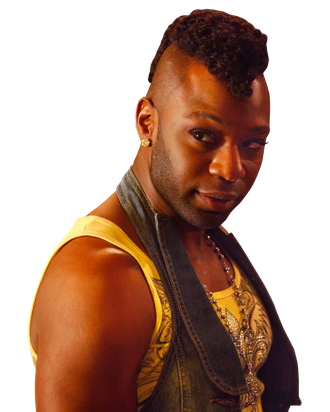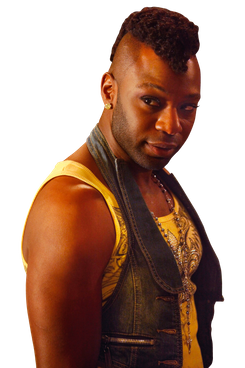

Give him your tired, your poor, your gay prostitutes, your drug dealers, and your symbolically orphaned and Nelsan Ellis will handily weave them all into one character. Or at least that’s what the Southern marine turned actor does on True Blood in the role of Lafayette Reynolds, the short-order cook who’s proven it’s possible to be both sassy and swaggering. This season, he’ll put his moxie to good use, nurturing a relationship with new boyfriend Jesus and taming a coven of overachieving witches. How does he do it all? We spoke with the molasses-tongued Ellis about the turmoil in store for Lafayette as well as Ellis’s real-life drama, which easily rivals his True Blood material.
You look nothing like Lafayette in real life. How much goes into physically getting into character?
Um, I wear more makeup than any of the girls on the show. I wore everything initially: eye stuff, lip stuff. That didn’t work too well on my face, so it just evolved to where it is now.
What about Lafayette’s hair this season? Was the Mohawk your idea?[Whispers.] Yeah, that was my idea. I figure since he’s got a boyfriend, he probably wants to jazz it up a bit.
Did you base Lafayette on anyone?
He’s inspired by my mother: his spirit, his strength, his femininity, his masculinity, his hand gestures, his hair pieces. A friend saw a picture of Lafayette and goes, “That looks like your mother, dude.” I don’t look anything like my mother, except when I’m Lafayette. I look like my father.
As a straight man, how concerned were you with not making a stereotype out of an already eccentric gay character?
I was very concerned. I didn’t want to offend anybody in the gay community. And I wanted to make a believable human being, not this concept of gay.
Do you think we’ll see same-sex marriage on True Blood, with either Tara or Lafayette?
I don’t think Tara’s gay; I think she’s in a phase. But Lafayette? I don’t think Lafayette is the marrying kind. He’s that person who floats and doesn’t want to be weighed down by a ball and chain.
Has your conservative father had any change of heart about you playing Lafayette?
He works at a meat-packing company and is a deacon in the church — he’s a man’s man, my father. So seeing his son look like that, you know, makes him uneasy. Anything that goes against his biblical nature was never allowed in the house — vampire shows, anything sexual. So it’s not just me. But he supports me in his own little way: [Chuckles.] He’ll turn True Blood on, but he won’t actually sit down and watch it.
This season, Lafayette has a boyfriend. What will this whole witch thing do to the stability he’s finally found?
You’d think it would sort of shake up the relationship, because Jesus is a witch and Lafayette don’t want nothing to do with that business. It’s a world he’s, quite frankly, afraid of, because his mother — we found out last season — may be somewhat supernatural in the witch world. But it actually brings a closeness. While they’re navigating this world, things happen and they have to protect each other.
It wouldn’t be Lafayette without the drama.
Oh yes. That’s [executive producer] Alan Ball’s recipe for success. The witches bring a whole lotta drama into everybody’s lives. They’re the ones shaking up the whole season, in terms of all the supernaturals.
Up to this point, the most traumatic thing to happen to Lafayette was in season two, when he was chained up like a slave by Eric. One of our readers wants to know how you felt about this.
I had a premiere party at my house, and one of my friends, as soon as they saw it, was like, “You look like Cinque [from Amistad].” But that’s Eric’s thing; he’d chain everyone up in the basement. I was uncomfortable, but it wasn’t a race thing at all. If I felt it was not for the right reasons, I absolutely would’ve said, “Alan, I don’t want to do this.”
It’s going around in the trade publications that Kevin Alejandro, who plays Jesus, is up for a regular role on Law & Order: SVU now. Does that mean there’s an end date on their relationship?
No, ‘cause if you know Kevin, he always has two jobs at the same time. He’s the only actor I know who can be a regular on two shows [the other being Southland, last year].
He’s kind of like Lafayette, who holds down three jobs, or like the Jamaicans in that In Living Color skit.
That’s what I tell him: “You might just be a Jamaican.” He goes, “No. I’m married.”
You had a tough childhood and grew up a ward of the state. Could you explain what that means?
My mother had some difficult times after her brother died. She needed a break. And we [Ellis and his siblings] were never given back to our parents, so we remained wards of the state, which is actually good, because you get a whole lot of financial aid. I lived with my grandmother in Alabama part of the time, but most of the time I lived with my auntie in Chicago.
And then at age 17, you became a marine.
I was! It was a quick escape from where I was living. But no one told me that when you’re in the military, they own you. I quickly changed up that situation.
And how does one do that?
I was like, “We’re going to have to turn this into reserves duty, ‘cause I can’t do this for 365 days out of the year anymore.” I just gave them problems for a long time — like, grew my beard and refused to cut it — until we figured that out. They even own you on the weekends!
How did you get to Juilliard?
It was not until I was 21. One day I woke up, and I was like, “What should I do?” I’d always dabbled in acting. When I wanted to become a serious actor, this girl told me, “You should go to Juilliard.” And I said, “Okay.” [Giggles.] I didn’t know it was hard to get into.
Another reader wants to know what your relationship with fellow student Rutina Wesley, who plays Tara on True Blood, was like back then.
There were not many black students at Juilliard, unfortunately. So when you get there, you become very good friends, in particular, with the other black students. Me and Rutina are probably closer than most: I love Rutina, and Rutina loves me. She dated my best friend for like 30 seconds, so I got to know a little more about her through him.
Vulture just interviewed her, and she’s actually very sweet, no spitfire like Tara.
You know what? I said this in an interview, and she got mad at me. She was like, “[In a high-pitched voice.] I am like Tara! I can be strong, Nelsan!” Can she be strong? Yes, but it’d take a lot. I mean, if you holler at her, she will cry.
And what were you like in school?
I was quiet. If I really wanted to say something, I would. I just wasn’t interested in saying anything. And that was a problem for my teachers. They said, “People won’t want to work with you. You seem too mysterious.” They were actually right. So my second year, I started to talk more. I became an angry black man!
Rutina told us that you’re responsible for putting the word “hooker” into Lafayette’s lexicon. Where did that come from?
From old Southern women. They call each other “hooker.”
When people meet you, do they just start calling you “hooker”?
They don’t call me “hooker.” They want me to call them “hooker.”
You’re also a playwright and won Lincoln Center’s Martin E. Segal Award for your play Ugly, inspired by your pregnant sister’s murder at the hands of your brother-in-law.
It’s a love story that’s a domestic-violence situation. It’s a big PSA on domestic violence, because domestic violence is so rampant. But my sister, you know, she was clearly in love with the man. She [already] had a child with him. She fought my family to keep this relationship. So I wanted to honor what she had. I was upset with the man, but I knew my sister. She’s going to come from the pearly gates “[Yelling in high-pitched voice.] Why’d you write it like that?!” He was in prison for a year of their relationship. I read some of the love letters they wrote, and they were poetic. I turned it into a screenplay called A Bird in the House. Hopefully, I can get HBO to do it one day.




